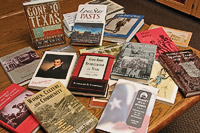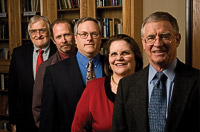 |
|||||||||||||||||

Texas State Historical Association Gone to North Texas
|
If it's Texas history, UNT has it covered. Known experts in everything from Spanish Texas to the Republic of Texas and slavery in Texas to Reconstruction in Texas, UNT's history faculty members have published numerous books on the great state. In fact, they've published more than 20 books about Texas history in the past 20 years alone, as well as some 50 articles and book chapters. This dedication to Texas history research and the faculty members' involvement with the Texas State Historical Association — several are TSHA fellows — led the association to choose UNT as its new home earlier this year. Located at the University of Texas at Austin since its founding in 1897, the TSHA — regarded as the nation's most dynamic regional history organization by historians — will open on UNT's campus this fall. Academics and non-academics "TSHA is heads and shoulders above most state historical associations because of the number of history experts in our state and because the level of interest among Texans about their state is remarkable," says Richard B. McCaslin, professor of history who was elected a TSHA fellow in 2006 after being a member of the association for years.
Randolph "Mike" Campbell, UNT Regents Professor of history, says the "genius" of TSHA "is the way it brings academics and non-academics together in studying the state's past." Many of the association's members don't teach Texas history as a profession but write and research history as a hobby. TSHA members elect an academic and a non-academic as president in alternate years, which has "worked incredibly well," says current president Fran Vick. "We fight about how Davy Crockett died at the Alamo, but then we shake hands and remain friends," says Vick, who previously was connected to UNT as a longtime director of the UNT Press. Texas specialists Campbell joined TSHA a few years after he arrived at UNT in 1966 as a specialist in Southern history. He says he began focusing on Texas because "many important things about Texas as a Southern state hadn't been studied." "The tendency was to focus on its Western past and to say that, for instance, slavery wasn't important in Texas. Slavery was actually as important to Texas as it was to Virginia," says Campbell, the author of An Empire for Slavery: The Peculiar Institution in Texas, 1821-1865.
A TSHA fellow, Campbell served as the organization's president in 1993-94. He also is the editor of the Southwestern Historical Quarterly, a TSHA publication that provides scholarly information about the history of Texas and the Southwest. A third TSHA fellow at UNT, Professor F. Todd Smith, says UNT's Department of History is committed to hiring specialists in Texas history. Smith, who has published extensively about the Indians of Texas, says several history faculty members who aren't TSHA fellows also have written books and teach classes on Texas history topics. In addition, Campbell and Donald Chipman, UNT Professor Emeritus of history and TSHA fellow, were advisory editors of TSHA's New Handbook of Texas, a comprehensive encyclopedia of Texas geography, historical events and historical people. Faculty members and graduate students also have contributed entries to the New Handbook of Texas. A 'good marriage' Campbell notes that TSHA also chose UNT because of the university's extensive library resources and because of the history department's commitment to teacher education. Since 1996, the department has offered an annual Teaching of History Conference for social studies and history teachers. Each conference focuses on a specific general topic, such as 19th-century leaders, and includes a Texas history component. UNT faculty members also regularly provide guest speakers and other programs to the general public. "TSHA has an education branch, so bringing it here fits with what we're already doing," Campbell says. Vick says moving TSHA to UNT "made for a good marriage." "We anticipate bringing schoolteachers and students to campus to participate in special events sponsored by TSHA and the Department of History," says Vick, who is in favor of having the Southwestern Historical Quarterly published by the UNT Press. "It will be high profile for UNT to have TSHA on campus, and it will be enriching for both of us." Gayle W. Strange, chairwoman of the UNT System Board of Regents, says the partnership between TSHA and UNT will serve the future of education in Texas well.
"UNT students, the North Texas communities and the entire state will benefit from this new collaboration, as together UNT and the association continue the work of preserving and strengthening Texas' heritage," she says.
|
||||||||||||||||
 He says he learned about the strengths of the organization, which is dedicated to preserving Texas' heritage and furthering the appreciation, understanding and teaching of Texas' unique history, while researching At the Heart of Texas: 100 Years of the Texas State Historical Association, 1897-1997, which he wrote at TSHA's request.
He says he learned about the strengths of the organization, which is dedicated to preserving Texas' heritage and furthering the appreciation, understanding and teaching of Texas' unique history, while researching At the Heart of Texas: 100 Years of the Texas State Historical Association, 1897-1997, which he wrote at TSHA's request.